What IT Wants From The Next White House
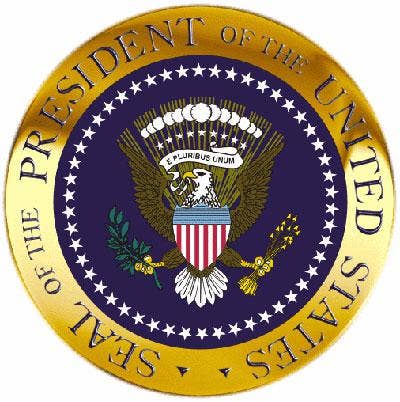
WANTED: PRESIDENTIAL CHANGE MANAGEMENT
Hungry for change? You got it. The upcoming presidential election is the first since 1952 that has no legacy from a sitting administration in the race. A fresh face, at least at the top of the winning ticket, is guaranteed.
John McCain has wrapped up the GOP nomination and only awaits his official coronation at September's Republican National Convention in Minneapolis-St. Paul. On the Democratic side, Barack Obama and Hillary Clinton continue to battle it out for their party's nomination and face a crucial primary showdown in Pennsylvania on Tuesday.
As each candidate makes his or her case to the voting public and various interest groups across the polity, it becomes increasingly important from our perspective to discover what Clinton, McCain and Obama plan to do for the IT and high-tech sector. Depending on your political persuasion, that could mean taking a more active role in industry issues or leaving us alone to innovate and grow our businesses. Our investigation of the candidates begins with a look at their IT-specific policy statements, as well as who is advising them on high-tech matters.
And who's winning the IT vote? A ChannelWeb online poll found that a plurality of our visitors prefer McCain (44.32 percent of the online vote), but combining the totals for Obama (41.08 percent) and Clinton (14.59 percent) gives the Democrats the majority backing of our readership. In the following pages, we interview top high-tech executives like John Chambers, Bill Gates and Paul Otellini, as well as a host of IT professionals, business owners, analysts and advocates for a more in-depth look at which candidates are winning over our peers and just what these industry opinion-leaders want to see from the next presidential administration.
The stakes are high and issues as far-ranging for our industry as services taxation, math and science education, cybercrime and Green IT are coming to the fore. Who's got your vote?

HILLARY CLINTON
Current job: U.S. Senator (D-NY)
Key IT advisors: Economic Policy Director Brian C. Deese; Senior Advisor for Science and Technology Policy Henry Kelly (president, Federation of American Scientists)
Highlights of official policy stance on high-tech:
Clinton's proposals 'to renew the nation's commitment to research; help create the premier science, engineering, technology and mathematics workforce; and upgrade our innovation infrastructure' include:
- Establishing a $50-billion Strategic Energy Fund
- Increasing the basic research budgets 50 percent over 10 years at the National Science Foundation, the Department of Energy's Office of Science and the Defense Department
- Increasing research focus on the physical sciences and engineering
- Requiring that federal research agencies set aside at least 8 percent of their research budgets for discretionary funding of high-risk research
- Ensuring that e-science initiatives are adequately funded
- Boosting support for multidisciplinary research in areas such as the intersection of bio, info and nanotechnologies
- Directing federal agencies to award prizes in order to accomplish specific innovation goals
- Tripling the number of NSF fellowships and increasing the size of each award by 33 percent
- Supporting initiatives to bring more women and minorities into the math, science and engineering professions
- Supporting initiatives to establish leadership in broadband
- Overhauling the R&D tax credit to make the U.S. a more attractive location for high-paying jobs
- Restoring integrity to science policy
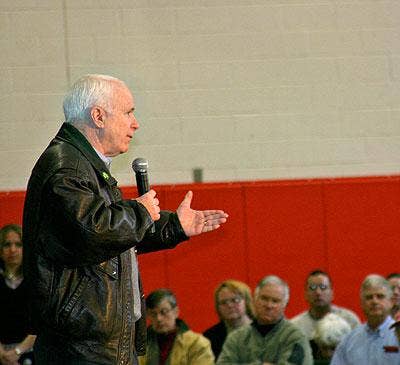
JOHN MCCAIN
Current job: U.S. Senator (R-AZ)
Key IT advisors: Technology Advisor John Chambers (Chairman and CEO, Cisco Systems Inc.) Technology Advisor Carly Fiorina (former CEO, Hewlett-Packard); National Campaign Co-chair Meg Whitman (outgoing CEO, eBay)
Highlights of official policy stance on high-tech:
McCain's plan to maintain U.S. leadership in developing 'advances in information technologies that have made us better at discovery, quicker to find the new idea that works' includes:
- Cutting the corporate tax rate from 35 to 25 percent
- Allowing a first-year deduction, or 'expensing' of equipment and technology investments
- Banning Internet taxes
- Banning new cell phone taxes
- Establishing a permanent tax credit equal to 10 percent of wages spent on R&D
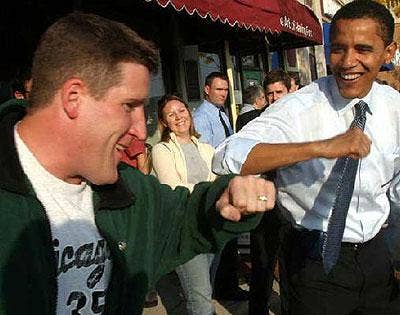
BARACK OBAMA
Current job: U.S. Senator (D-IL)
Key IT advisors: Senior Economic Advisor Austan Goolsbee (professor of economics, University of Chicago); Economy, Globalization and Trade Policy Co-Chair Daniel K. Tarullo (professor of law, Georgetown University)
Highlights of official policy stance on high-tech:
Obama's path towards becoming 'the generation that reshapes our economy to compete in the digital age' includes:
- Appointing the nation's first Chief Technology Officer (CTO) to ensure that our government and all its agencies have the right infrastructure, policies and services for the 21st century
- Supporting the principle of network neutrality to preserve the benefits of open competition on the Internet
- Increasing the Federal Trade Commission's enforcement budget and stepping up international cooperation to track down cyber-criminals so that U.S. law enforcement can better prevent and punish spam, spyware, telemarketing and phishing intrusions into the privacy of American homes and computers
- Making government data available online in universally accessible formats to allow citizens to make use of that data to comment, derive value, and take action in their own communities
- Employing technologies, including blogs, wikis and social networking tools, to modernize internal, cross-agency, and public communication and information sharing to improve government decision-making
- Deploying next-generation broadband ... bringing broadband to our schools, libraries, households and hospitals
- Investing $10 billion a year over the next five years to move the U.S. health care system to broad adoption of standards-based electronic health information systems, including electronic health records
- Supporting pilot programs that provide incentives for businesses to grow their IT workforce in inner-cities and rural communities
- Doubling federal funding for basic research and making the R&D tax credit permanent
- Giving the Patent and Trademark Office the resources to improve patent quality and opening up the patent process to citizen review to reduce the uncertainty and wasteful litigation that is currently a significant drag on innovation
- Restoring the basic principle that government decisions should be based on the best-available, scientifically-valid evidence and not on the ideological predispositions of agency officials
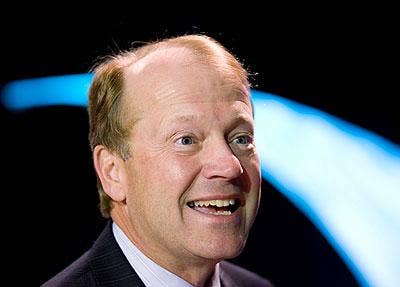
THE NETWORKER
Who: John Chambers
Bio: Chairman and CEO of Cisco Systems Inc., San Jose, Calif.
Endorsing: John McCain
The Skinny: As a senior technology advisor to Republican candidate John McCain, Chambers has a dog in this fight. But the Cisco CEO favors networking over partisanship in government's efforts to leverage IT's 'enabling capability' to achieve national goals like 'expanding health care to all people in our country.'
What he wants from the next presidential administration:
Technology should be separated from politics, and I think our industry, better than most any of the key traditional business industries, has done a good job of that. We get along very well with the Democrats and the Republicans, and while I personally support Sen. McCain and think he would make an excellent president, we'll get along with a potential President Clinton and a potential President Obama.
So for the next president, a key thing will be the ability really to say, 'How does high-tech enable a nation's strategy, be that health care, education, job creation, etc.?' What we would hope to see in the next president, be they Republican or Democrat, is somebody that really understands how to use technology to address growth opportunities, job creation, more economic stability, productivity which translates into better standards of living, and giving this opportunity to more and more people. And an ability to tackle the tough issues, such as health care, etc. ... expanding health care to all people in our country, I think should be a major national goal.
And an enabler of that should be high tech, because if you can take 20 or 30 percent of the costs out of health care and use the savings to provide services to those that aren't getting covered, you could not only provide a higher quality of health care, you could do it in a way that gives access to it to all Americans.
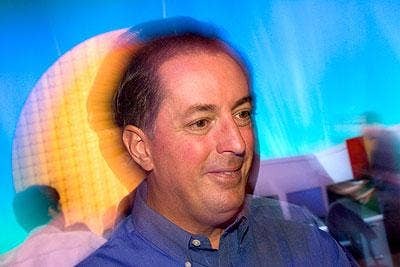
THE CHIP MAKER
Who: Paul Otellini
Bio: President and CEO of Intel Corp., Santa Clara, Calif.
Endorsing: Declined to state
The Skinny: The top executive at the top semiconductor company in the world is understandably big on innovation. Otellini argues that lower corporate taxes, more R&D funding and incentives, and a major upgrade for our 'outdated' patent system are all needed to maintain U.S. high-tech leadership.
What he wants from the next presidential administration:
Among our biggest issues is the competitiveness of the U.S. and our high-tech industries that help fuel America's growth. Take the R&D tax credit, for example. Without a doubt, this credit helps keep innovation and high-paying R&D jobs in the U.S. Yet our lawmakers have let the credit expire repeatedly over the years, instead filling the gap with repetitive short-term extensions which, frankly, have negative financial consequences and disrupt research planning. This key credit should be enhanced and made permanent as soon as possible. We would also like to see a cut to the corporate tax rate, which also has significant impact on U.S. companies' ability to compete.
A related issue is the failure to boost funding for basic research in our national labs and universities. We need the political will to provide the funding that was agreed to by Congress and the President last year with the America Competes Act. Longer-term, of course, the U.S. needs to strengthen math, science, and engineering education at the K-12 through graduate school levels, something Intel is very committed to and devotes over $100 million to annually. But to ensure U.S. competitiveness in the meantime, employers have to have timely access to highly skilled foreign nationals.
We also would like to see the next administration continue to support the advancement of trade agreements worldwide in order to improve access to markets around the world. Globalization of trade can cause difficult economic adjustments, so we strongly support appropriate measures to re-train workers to mitigate these impacts. A final issue to mention is the outdated U.S. patent system, which fosters questionable patents and frivolous litigation that hinders innovation and raises costs to companies and prices to consumers.
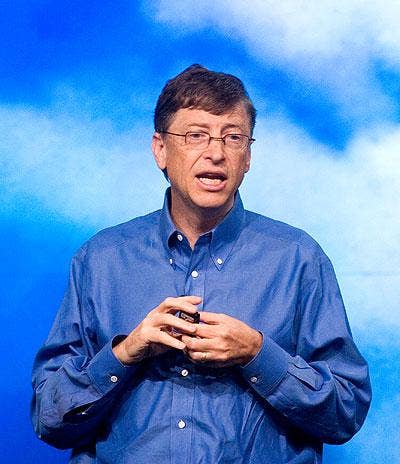
THE ELDER STATESMAN
Who: Bill Gates, Chairman of Microsoft, Redmond, Wash.; Co-Chair, Bill and Melinda Gates Foundation
Bio: Executive Chairman of Microsoft Corp., Redmond, Wash.
Endorsing: Declined to state
The Skinny: Gates' active role at Microsoft is declining even as his charitable work as Co-Chair of the Bill and Melinda Gates Foundation ramps up. Perhaps the most famous architect of the computing revolution, Gates is often called upon by government and business groups to advise on sound policy for promoting high-tech innovation and in recent years he has stressed investment in education, R&D and allowing for greater mobility in the global IT workforce.
What he wants from the next presidential administration (taken with permission from Gates' testimony to Congress on 3/12/08):
I am optimistic about the potential for technology to help us find new ways to improve people's lives and tackle important challenges. I am less optimistic, however, that the United States will continue to remain a global leader in technology innovation. ... In particular, I believe that there are two urgent reasons why we should all be deeply concerned that our advantages in science and technology innovation are in danger of slipping away.
First, we face a critical shortfall of skilled scientists and engineers who can develop new breakthrough technologies. Second, the public and private sectors are no longer investing in basic research and development at the levels needed to drive long-term innovation. If the United States truly wants to secure its global leadership in technology innovation, we must, as a nation, commit to a strategy for innovation excellence. ... Such a strategy cannot succeed without a serious commitment from -- and partnership between -- both the public and private sectors. ... I believe this strategy must place top priority on achieving four fundamental goals:
1. Strengthening educational opportunities, so that America's students and workers have the skills they need to succeed in the technology- and information-driven economy of today and tomorrow.
2. Revamping immigration rules for highly skilled workers, so that U.S. companies can attract and retain the world's best scientific talent.
3. Increasing federal funding for basic scientific research, to train the next generation of innovators and provide the raw material for further innovation and development by industry.
4. Providing incentives for private-sector R&D, so that American businesses remain at the forefront in developing new technologies and turning them into new products and services.
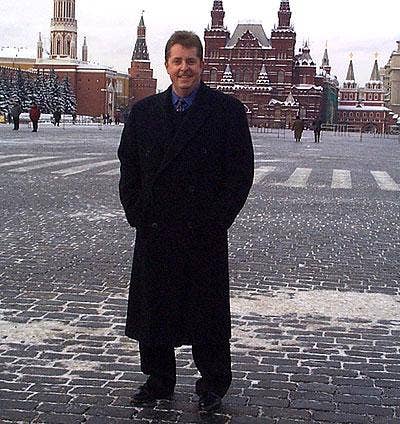
THE SALESMAN
Who: Chris Franey
Bio: VP of marketing and commercial sales, Samsung, Ridgefield Park, N.J.
Endorsing: Declined to state
The Skinny: Franey wants lower taxes, sure, but like a true marketing exec, the Samsung VP is equally concerned with repairing America's image abroad after six-plus years of war.
What he wants from the next presidential administration:
I want someone who's going to make sure they lower people's taxes and who is fiscally responsible and who will do what's necessary to repair some of our PR image around the world. As somebody who's lived overseas, I got to see the pre- and post-9/11 impact and the pre- and post-Afghan and Iraqi war impact on our image around the world. I went overseas in 1999, and it's completely different -- before and after 9/11. We have a lot of work to do there to be truly global.

THE CYBERCOP
Who: Dave Roberts
Bio: VP of sales and channel for the Americas, Websense, San Diego, Calif.
Endorsing: Declined to state
The Skinny: Roberts, formerly an employee of Microsoft, agrees with his former boss Bill Gates that the cap on H-1B visas for technology workers needs to be raised. In the IT security arena his current company works in, he argues that the rapid commercialization of malware needs to be addressed.
What he wants from the next presidential administration:
I think one of the biggest issues we've got is this limitation on visas. I worked at Microsoft a long time and I can remember Bill Gates standing in front of Congress and saying, if you put a limit on visas for IT workers, you're creating a model for outsourcing. We are a little company and we now have 250 people in Beijing. And when I think of having 150,000 visas a year coming into the market, big companies like Microsoft and Symantec, they just swamp us. We need the capability to have more jobs here in the United States, and they need to expand the ability to get visas to IT workers and developers. That's kind of my big issue.
On security, threats will continue on the Web, they're getting more and more sophisticated. I think it's a commercial issue now and people are doing it for money now, it's not just malicious. And data leakage will continue to be a big issue.
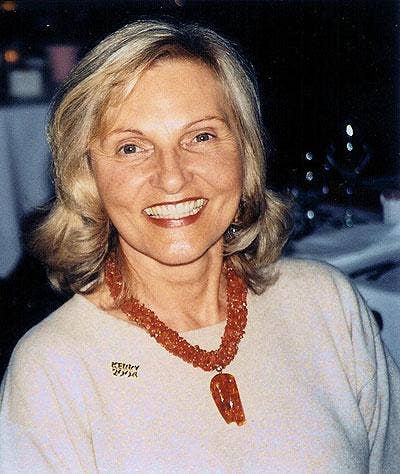
THE ADVOCATE
Who: Nancy Ramsey
Bio: Futurist, author and entrepreneur; board member, Anita Borg Institute for Women and Technology
The skinny: Ramsey's concerns range from 'sneaky' taxes on Internet transactions in the form of fees to a need to get 'far more serious' about education in math and science. She has served as Legislative Director to Sen. John Kerry (D-Mass.) and has a direct line to issues involving the technology and exploration of space thanks to her marriage to original Apollo astronaut Rusty Schweickart.
Endorsing: Barack Obama
What she wants from the next presidential administration:
I'd like to see that we don't tax information or information exchanges. People say we're not going to levy taxes, but then we see fee increases, which are essentially a sneaky way to tax. I don't want to see fees on Internet exchanges. Of course, in other areas, we will need to raise taxes. Here's my question for the people who reflexively oppose any new tax: 'If you don't want to raise taxes, how do you see us dealing with the economic crisis we're facing?' People don't want to talk about the cost of the war ... and it's all off-budget!
The next administration must be far more serious about education, with an emphasis on including minorities and women, especially in science and technology. When we lose that potential in the next generation, we lose the potential for national dominance. If we're going to stay in the front, technological education is crucial. In the last 30 years, 40 new rocket engines have been built. Only two of those have been built in the United States. That said, I am deeply concerned about the weaponization of space.
I would like to see the continuation of funding post-graduate work. The kind of creativity that comes from graduate and post-graduate students is great because they haven't yet entered the system that stymies that. And the cross-disciplinary nature of post-graduate work is really crucial here. You don't have a biology post-doc student now who doesn't also have a computer science or business degree. To keep open the funding for these sorts of educational pursuits is crucial.
I'm torn as to whether our government should be involved in projects like One Laptop Per Child. We have one in our house, because we did the 2-for-1 deal where one goes to a child in a developing country. When you get into the USAID infrastructure, you're talking about huge overhead. International programs like Unicef and Save the Children are better at that sort of thing than the U.S. government.
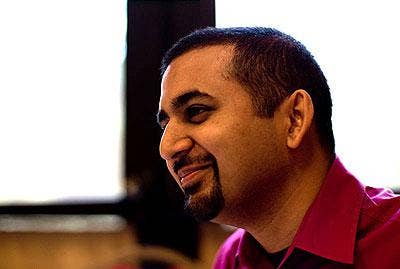
THE EVANGELIST
Who: Anil Dash
Bio: Technology blogger and VP, Web publishing developer Six Apart
Endorsing: Declined to state
The skinny: Dash, a tireless promoter of Web 2.0 social networking tools for private and public sector information exchange, would like to see the White House lead the charge in adopting such tools to bring government efficiency and transparency into the 21st century.
What he wants from the next presidential administration:
At a very high level, we obviously are concerned with the history of the last presidency. In some good ways it has been hands-off with the tech industry, but it's not doing enough to acknowledge how much the high-tech and Web industries drive the economy. Getting more kids on track for tech careers should be a priority. We need to get more attractive candidates to hire.
Four years ago we provided tools for Howard Dean and George Bush, so we saw some politicians use blogs and social networking tools in their campaigns. But as soon as they got elected, they dropped the tools. It's treating the community like we're cheap. It was a milestone when Dean raised a million dollars in a day. Now they do it every day. The No. 1 thing we want to see is elected officials use social networking tools online as a tool for governance and for leadership when in office, just as they do to get elected. The reason is that the tools are built for transparency. You can't use them and not be transparent.
There are departments, like Defense, the IRS and the Census Bureau that are using social networking tools. The IRS has blogs. But it's not widespread. It's fractured.

THE MANAGED SERVICES PROVIDER
Who: Oli Thordarson
Bio: CEO of Alvaka Networks, Irvine, Calif.
Endorsing: John McCain
The skinny: Thordason, a reluctant McCain supporter, is deeply concerned with taxes on IT service providers like Alvaka Networks and wants guarantees that such policy is stopped dead in its tracks.
What he wants from the next presidential administration:
People in our industry should really be concerned with the issue of service taxation, such as a tax that was just enacted in Maryland. This is probably a potentially more directly threatening issue for the VAR/service provider/MSP community than any of the issues that a lot of people are talking about.
There has been some talk of this sort of tax happening in California, although a Republican state senator, [Tom] Harman, seemed to minimize the threat when I spoke with him recently. But if something like this takes hold and starts sweeping the country, it will be a huge issue cutting into our client's IT budgets everywhere.
Without much enthusiasm I must say I will have to back McCain, but he is not much different or much better for the IT industry than the other candidates.

THE ACADEMIC
Who: Lawrence Lessig
Bio: Stanford professor of law; founder and CEO of the Creative Commons; board member of the Electronic Frontier Foundation
Endorsing: Barack Obama
The skinny: Lessig, a pioneering advocate for network neutrality and amending patent law to promote open-source innovation, is also a staunch supporter of Barack Obama.
What he wants from the next presidential administration:
I think there is an extraordinarily dangerous threat in the use of patents to block open-source development. Government has a role to make sure that patent law is not more expansive than is productive or necessary. Is the area that you are providing patents producing value, driving innovation? In areas like drugs, yes. In software, no. So I would strongly suggest rethinking patent laws.
There have to be strong anti-trust principles and they have to be clear. The government has to be clearer on these principles, like in the 700 MHz FCC wireless spectrum auction, there was a refusal to set an auction cap, which naturally leads towards concentration. Government needs to create a subtle balance to avoid these kinds of problems. I think we should not rely on corporations to be quasi-governments. A corporation is a tiger, its job is to make money for its shareholders in a way that's consistent with the law. The government shouldn't weaken our will in that regard. The real objective is to get government to get policy right, and for corporations to compete and make money in accord with that policy. And we should welcome their success when they do so.
There are basic issues, where [the Democratic] candidates seem similar, such as a commitment to network neutrality. But in the details, Clinton and Obama are actually different. She's not really been pushing it, but he has a very strong position, which is to block discrimination on the same use by different people. So a provider couldn't, say, charge more for Yahoo video but less for Google video, for example. There's also a big difference in the way they want to make government open or transparent. Barack's talking about more than just making the government's Web sites as nice as possible. They're never going to be as transparent as we'd like. But he's saying, 'Let's make government data accessible in ways that machines can use them.'
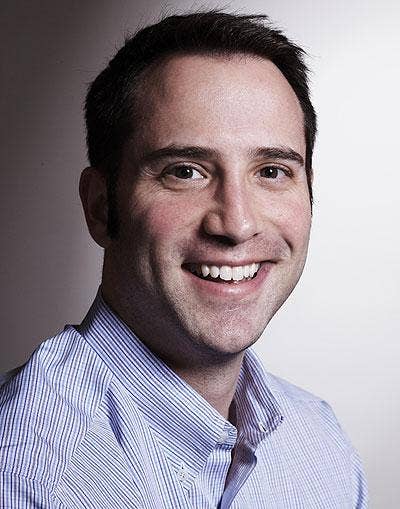
THE START-UP FOUNDER
Who: Joshua D. Rand
Bio: Co-founder and CEO of New York, N.Y.-based Sapotek Inc., a U.S./Mexican developer of open-source Web applications and services such as free online desktops; attorney-at-law; former economic adviser to the New York City Comptroller
Endorsing: Declined to state
The skinny: Rand, as an open-source developer of products like Sapotek's Desktoptwo (English) and Computadora.de (Spanish) free online desktops, would like to see federal policy that mandates the inclusion of open-source vendors in government procurement bids, while also pushing for direct investment in technology start-ups.
What he wants from the next presidential administration:
I admittedly know more about the Democratic candidates, but I don't see any of the [three major candidates] as antithetical to technology. I can tell you this, there's one thing I would like to see and that is to adopt a procurement policy that at the very least requires that open-source vendors are at the table. If you look at countries in Northern Europe, they have that. In fact, all of Europe does, because it's EU policy. If you look at Latin America, Brazil and Argentina, all of these countries have this. The United States doesn't have any policy like this, and I think it's foolish not to.
I don't know which of the candidates is more amenable to adopting a policy like that. I would think Barack probably is, and because Barack is, Hillary probably is too. And then McCain wouldn't want to be perceived as a dinosaur.
Technology is an enabler. And the government, if it wants to work on behalf of the American citizen and consumer, should work towards supporting alternative technologies that are more cost-efficient and potentially grow jobs as well. I mean, you're talking about technology companies. And the model of the 80s and 90s and even until today has been that private equity and venture capital funding has supported technology for the most part. But look at Canada, look at Ottawa. If you start a technology company right now, move to Ottawa. They'll pay for everything, they'll pay your rent, they'll pay for your bandwidth, they'll do everything.
In America we don't have anything like that. It's ridiculous. The United States is funny. Look, our markets have been relatively liquid for underwriting technology and development, but that's all been private money. I think the United States government would do well by its citizens if it would support technology companies that are creating technologies that improve efficiencies.

THE GOVERNMENT CONTRACTOR
Who: Julienne Givot
Bio: Director of Managed Services, Varsity Technologies, San Francisco, Calif.
Endorsing: Declined to state
The skinny: Givot hopes the government accelerates its promotion of energy-efficient, environmentally friendly technology for ecological reasons, and also hopes it will drive job creation in the Green IT sector.
What she wants from the next presidential administration:
The next administration should devote more energy and attention to the environment and creating environmental jobs. Hopefully that would lead to some job creation in the technology market. Ideally the government would be able to go even further in incentivizing Green IT, with tax incentives and by promoting the use of virtualization and recyclable hardware.
Green IT definitely has a cool factor, but in terms of the business impact, you are also looking at the life cycle of your infrastructure. Our customers are very interested in Green IT for this reason. Our education and nonprofit clients are more focused on that sort of thing because they can get more grants, for example, if they're using Green IT. So it's not that difficult of a sell for us.
Given the current state of the economy, people are really seeing the value of energy-saving technology. We work in the education and non-profit sector, so it will probably be six to eight months before we see a recession begin to affect our budgets. We're promoting virtualization along with infrastructure upgrades, which is a little bit easier for our clients to invest in now, because they know that they will realize savings in the long term.
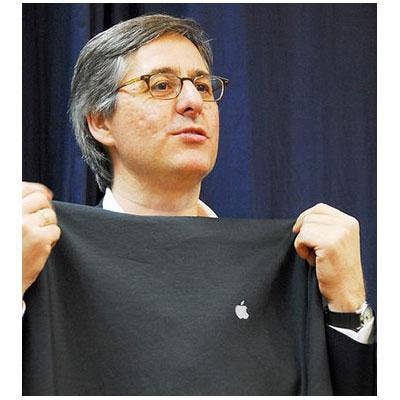
THE SATIRIST
Who: Fake Steve Jobs a.k.a. Dan Lyons
Bio: Journalist and provocateur, Forbes.com
Endorsing: Barack Obama
The skinny: Lyons has taken Silicon Valley by storm with his hilarious rendition of Apple CEO Steve Jobs' foul-mouthed, blogging id. Here he lets FSJ off the leash to comment on the state of Electard 2008.
What he wants from the next presidential administration:
Leave us the hell alone. Seriously. You don't understand tech and you shouldn't pretend to. Oh, except you could maybe hobble Microsoft a bit. That would be good. I'm sure if the Dems get in we'll have another DOJ anti-trust case.
We must keep Hillary Clinton and her dangerous husband out of the White House. And I like Obama's message about trying to bring people together rather than splitting them apart. I'm sickened by the race-baiting and other divisive tactics that the Clintons have used in this campaign. Obama may be naive but his heart seems to be in the right place.

THE OUTSIDER
Who: Barry Johnson
Bio: Manager of FrontierPC.com, a Vancouver, B.C.-based IT solution provider
Endorsing: Declined to state
The skinny: As a Canadian, Johnson won't be able to cast a vote in this year's presidential election, but like many people outside the U.S. he's watching the proceedings with a great deal of interest -- not least because the next president's trade and economic policy will have repercussions well beyond American borders.
What he wants from the next presidential administration:
The Democrats have us extremely worried about tearing up NAFTA. The words I've heard on the news were that 'We're thinking about tearing up the free trade agreement,' which I think is just silly, because we really are one economy. All of us are saying, 'What the heck? What's going on here?'
We can see that the U.S. is having some trouble economically, and in Canada we're always nervous that it will follow because we're so tightly involved with each other. So we're expanding our business to an e-commerce division which we just opened up to help recession-proof us. So basically we're spreading our business from being regional to being national. So if one region, like Vancouver, happens to be really slow, we could be doing well in Toronto. There's a safety valve in having more regional plays.
Green IT is here to stay and government can do a lot to promote it. Our government has actually legislated recycling fees as well as tax cuts for green companies. On the environment, Canada's truly a leader. When you buy a PC you pay a $12 recycling fee. You have incentives for small, medium and large corporations, tax incentives for being green.